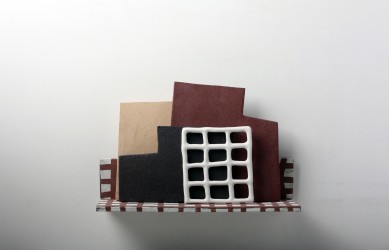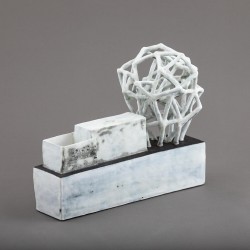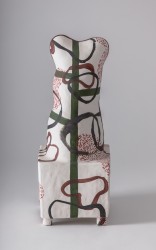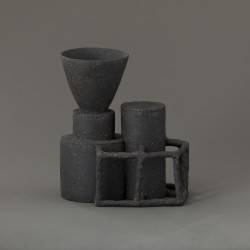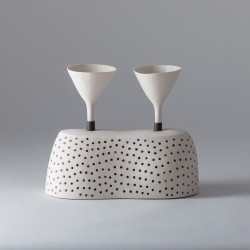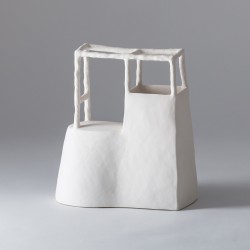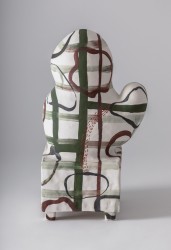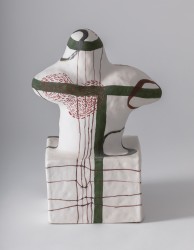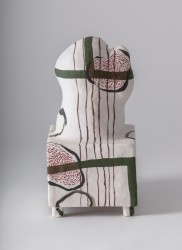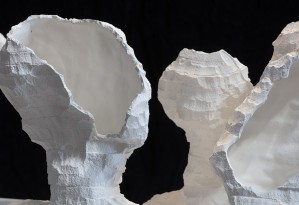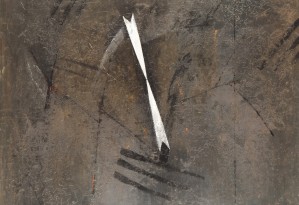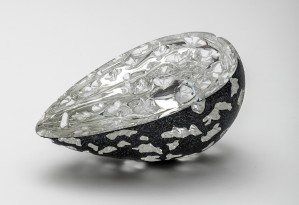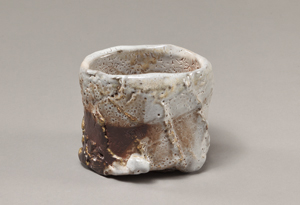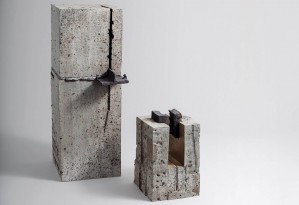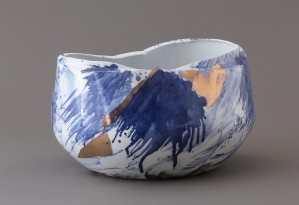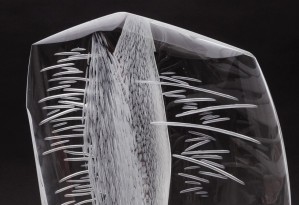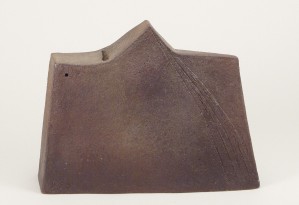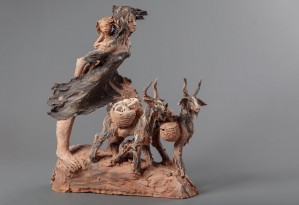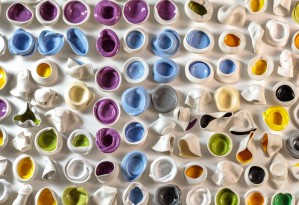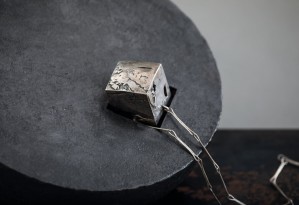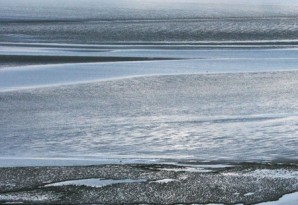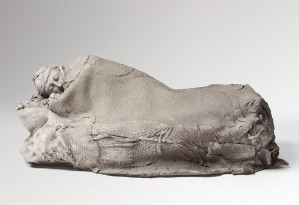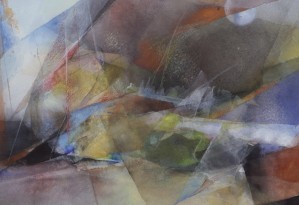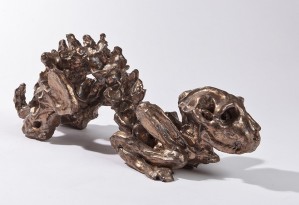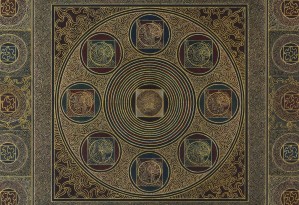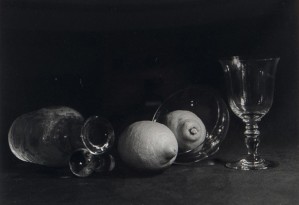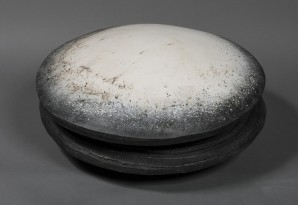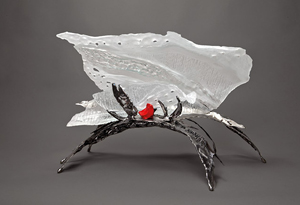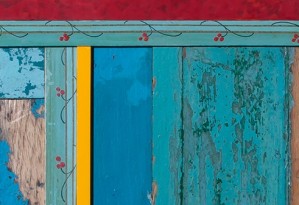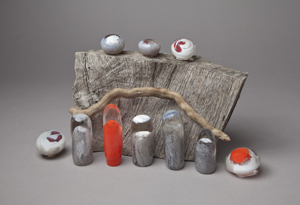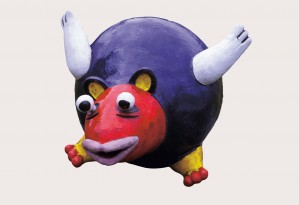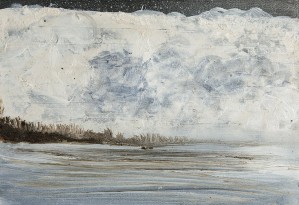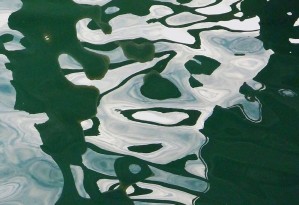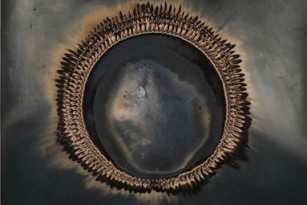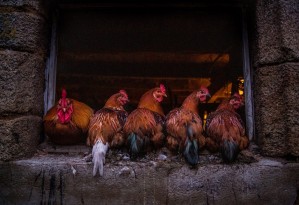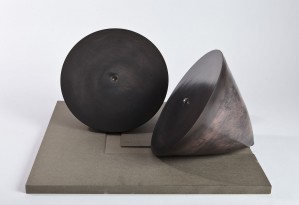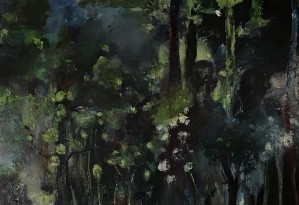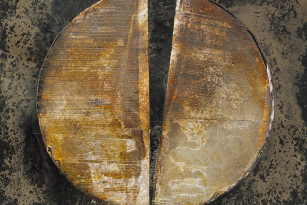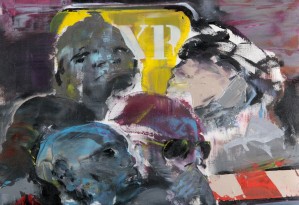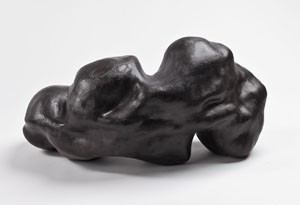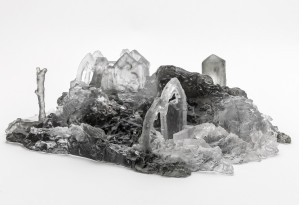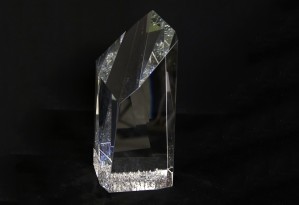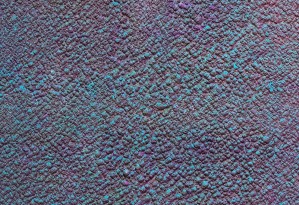CORREGAN Daphné, sculpture, ceramic, Permanent artist of Galerie Capazza since 1997
« My God, deliver me from the model ! » (Diderot, Salon de 1765)
There’s always a sensitive intuition at the roots of Daphne Corregan’s work that she sketches out either in drawings, photographs or even through a conversation, becoming possible cornerstones for her ceramic art.
One wouldn’t call Daphne’s work sculptures. They cannot be defined by their relationship to space because they already are space; a space that’s been stretched, cut up, partitioned; a space that doesn’t represent the world but the idea we have of it. In which the anecdote is excluded.
So what is at stake in an important piece like « Divided Spaces » (and I’m not referring to its dimensions) is nothing less than the power thought has to make an artistic utopia exist. This piece is related to other works like « Spaces and Squares » or even « Preserved Spaces » made in 1998 which marks the beginning of this reflexion. The question being: « what do we do with our lives? How do we partition them? And why? Do these walls serve to protect us? And then, what are we afraid of? It’s within these most secret preoccupations that our own mythologies are formed, and from which Daphne Corregan’s work originates.
Even when she makes an obvious reference to what is generally « exclusively reserved to classical sculpture » such as the representation of the human head, her work appeals less to what we know intimately or to the anatomy of the head than to a reflexion on the head-object as such; referring us to the double of a head, threatened, emptied, pierced, sent back to its sterile emptiness.
Part of creating is answering questions that no one understands; the questions that push us against the wall. Art is one of these limits from where it’s possible to find an answer to the disorder of the world and our inner turmoil. Let’s not forget that already in 2000, Daphne Corregan presented the ceramic world with an image of terror held at a distance in the form of a monumental burka strewn with crystal roses. She succeeded in bringing forth the glorification of veiled women by the very representation of what is supposed to humiliate them.
With time, it appears that her relationship to the body has changed and that the revolt has been substituted by a reflexive introspection, a self awareness where the question is no longer « what have you done to this body?» but « what is the body? »
Her research on the image of the head arises from this interrogation that is at the source of our idea of intimacy. Here, the head (the « core of violence » for A. Giacometti) becomes the core of mystery; a mystery that sometimes finds its solution in duplication. But two heads side by side only reflect their own silence. The idea of connecting them by the mouth as in « Breathing under cover » is a beautiful one. By linking them Daphne invents a disturbing object because the kiss, yes, strangely turns us into a two-headed being, whose twinness is monstrous. Therefore, Daphne Corregan’s answer sends us back to a human reality where lovers are considered as lost beings for the the rest of the world. Octavia Paz gave an account of the love reality when he wrote: « universes strewn about/ a world falls/ a seed flares up». Here, the singularity of the love relationship is suggested in the form of some kind of an unknown spaceship. The only reason this image is disconcerting is because it concerns a mystery: the encounter of two beings.
But love dialectics are complex and two connected beings are also two chained ones. The two figures connected by their ears staring straight ahead no longer refer to twinness but to the Siamese relationship, both perverse and disturbing, and remind us of Hitchcock’s film The 39 Steps where the two actors Robert Donat and Madeleine Carroll are handcuffed and therefore forced to remain together.
Please understand me, if Daphne Corregan’s work might first appear strange or disorientating, etc…it always winds up feeling (or almost feeling) evident. We are at the heart of a work in which the poetic intuition and creative imagination converse.
What is at stake in work like this is more the vision than the observation.
In this poetic apprehension of the world, the heads, constantly placed side by side, become something other than heads, The vases converse, becoming a kind of mysterious alembic (« communicating vessels ») while the houses’ surrounding space becomes completely closed in by insurmountable walls. No communication is possible in the tiny rooms that look like little suburban boxes. The Siamese heads could live there. But « Breathing Under Cover » turns the tables around. All of Daphne Corregan’s work plays with the dialectics of open and closed, with holes or with not, with circulating air or not. And one never knows ahead of time what the result will be since one piece is built on the ruins of the next. This is what creation is all about.
So it is only logical that her latest creations « Breath » and « Clouds » should be looked at from the philosophical perspective of the disappearing of the model because what Daphne is showing us are pieces that only reflect each other, UAOs, (unidentifiable art objects) that shine at the limits of the world of known objects, improbable constellations, as light as clouds and like clouds, strange and puzzling. Daphne again contributes to the universe of forms with these objects that allow, as Lambrercy says, to take « stock of the world ».
Michel Le Gentil
Extract from the catalogue Daphné Corregan, Editions Galerie Capazza, 2013
Read more
Biography
Born december 1954 in Pittsburgh, Pennsylvania, USA
1972 Studies at the École des Beaux Arts of Toulon, France
1973 Studies at the École des Beaux Arts of Marseille, France
1974-77 Studies at the Ecole des Beaux Arts of Aix - en - Provence, France
1978 Study trip to the USA - residency at the The Sun Valley Center for the Arts and Humanities, Sun Valley, Idaho
1989 Responsible for the ceramics studio at the Municipal School for the Visual Arts in Monaco
1991 Training course : Pâte de Verre under Etienne Leperlier at the Centre International du Verre à Sars - Poteries, FR Study trip to Burkina Faso in the context of the government funded project Projet d’Afrique, conceived by Camille Virot BF
1993 Training course : Glass slumping under Warren Langley at the Centre International de Verre à Sars - Poteries, FR
1995 Training course : Bronze under Gérard Auvray at Transfaire, Donzy, FR
1996 Training course : Casting under Alès Vasicèk at the Centre International de Verre à Sars Poteries FR
1997 Training course : Casting under Vincent Van Ginneke at the Centre International de Verre à Sars Poteries FR
1998 Training course : Traditional Bronze under A. Kehinde Ken MC
1999 Invited guest at the symposium France, Niger, Japon, Ateliers de Fontblanche, Nîmes, FR
2002 Works with primary schools for the government initiated Artistic and Cultural Project for Children - Dieulefit, F Conference on Contemporary French Ceramics at the French Embassy in Washington, DC, USA Invited guest at the colloquium on International Contemporary Ceramics, Keramikmuseum, Westerwald RFA
2004 Conference at the School of Decorative Arts, Geneva, CH Conference at the Bruckner Fondation, Carouge CH Collaborates with the Fuping project in China for French artists in residence and for the opening of the Museum for Contemporary French Ceramics in Fuping, China
2005 Artists residency in Fuping, China Invited guest for the exhibition Protect Childhood, CH
2008 Initiates a ceramic network for ceramic education with 5 European universities, ECART (European Ceramic Art and Research Team) Artist Residency San Bao International Ceramic Exchange, China
2010 Lecture at the Museum for Decorative Arts on « ECART » and the Pavillon Bosio, Paris
2012 Workshops and conferences Johannesbourg, Durban, Port Elizabeth Prétoria et Cape Town ZA Award judge for the 2012 National Ceramics Exhibition, Pretoria Art Museum ZA Workshops and conférences Windhoek, NA Jury member for the 4th David Miller Prize
Lives and works between Draguignan, France and Monaco
Member of International Academy of Ceramic
Personal Exhibitions
2021 Exposition Breathing, Daphné Corregan, Terrail, space for ceramics and contemporary art, Vallauris Golfe - Juan, France
2019 Galerie Catherine Issert, Saint-Paul-de-Vence, France
2018 COMPLEMENTERRES, Le HANGART à Draguignan, France
2015 Kunstforum Kirchberg, Solothurn, Switzerland
Conversations Musée Théodore Deck, Guebwiller, France
Shared workshop between Gilles Suffren and Daphne Corregan, Galerie Empreintes, Aydat, France
2014 Musée Jean Cocteau - collection Severin Wunderman, Menton, France
Loft, galerie Sandrine Mons, Cannes, France
Terra Keramiek, Delft, Netherlands
2013 Galerie CAPAZZA Nançay, France
2012 Daphne Corregan et Gilles Suffren, Abbaye Coat Malouen, Kerpert, France
2011 SOFA New York, The Armory, New York, USA
Solothurn Kunstforum, Solothurn, Switzerland
2010 SOFA New York, The Armory, New York, USA
Voyage Américain, 6,Mandel et la galerie Nathalie Béreau, Paris, France
2009 SHOW OFF Paris, represented by the Galerie San, France
Galerie Hélène Porée, Paris, France
Galerie Nadia B, Dieulefit, France
Espace Culturel François Mitterrand, Beauvais, France
2008 Galerie Terra Keramiek, Delft, Netherlands
Galerie Chantal Bamberger, Strasbourg, France
Galerie Le Cercle dans le Carré, Marseille, France
Galerie Fusion, Toulouse, France
2007 Galerie Marianne Brand, Carouge, France
Galerie Sandrine Mons, Nice, France
2006 Collect Victoria and Albert Museum, London, United Kingdom
Galerie Geneviève Godar, Lille, France
Solothurn Kunstforum, Solothurn, Switzerland
Galerie Remarque, Trans en Provence, France
Médiathèque des Quatres Chemins,La Trinité, France
2005 Abbaye d’Arthous, Hastingues, France
RAI International Art fair, represented by the Galerie Terra in Amsterdam, Netherlands
2004 Galerie Marianne Brand, Carouge, Switzerland
Stadtmuseum Hüffingen, Hüffingen, Germany
2003 Galerie Zola, bibliothèque Méjannes, Aix en Provence, France
Terra Keramiek, Delft, Netherlands
Galerie D.M. Sarver, Paris, France
2002 Galerie m-Bochum, Bochum, Germany
Galerie Marianne Brand, Carouge, Switzerland
Galerie Capazza, Nançay, France
Galerie Katuin, Groningen, Netherlands
2001. Die Galerie, Hufingen, Germany
Daphne Corregan, Maison de la Terre, Dieulefit, France
Galerie Complément d’Objet, Les Martots, France
Galerie H.D. Nick, Salle Lawrence Durrell, Sommières, France
2000 Kunstforum Kirchberg, Kirchberg, Switzerland
Galerie DM Sarver, Paris, France
Galerie les Teinturiers, Avignon, France
Galerie Anderwereld/Katuin, Groningen, Netherlands
Galerie Marianne Brand, Carouge/Geneva, Switzerland
1999 Galerie les Teinturiers, Avignon, France
Galerie Anderwereld/Katuin, Groningen, Netherlands
Galerie Marianne Brand, Carouge/Geneva, Switzerland
1998 Galerie Couleurs du Temps, Geneva, Switzerland
Galerie HD Nick, Aubais, France
Galerie Nadir, Annecy, France
Galerie D. M. Sarver, Paris, France
1997 Galerie Ortrud Charvet, Saint Martin de Ré, France
Galerie Geneviève Godar, Lille
1996 Glass Slippers, Maison de la Céramique, Mulhouse, France
Galerie H.D.Nick, Aubais, France
Galerie D.M.Sarver, Paris, France
Galerie Hyaline, Marseille, France
1995 Les Arts Verts, Saillac, France
L’éloge de l’ombre, Uzès, France
Daphne Corregan musée d’Art contemporain de Dunkerque, France
1994 Atelier des Créateurs, Cannes, France
Galerie DM Sarver, Paris, France
1990 Alice ou Derrière le miroir - Galerie Utopie, Uzès, France
Galerie B15, München, Germany
1987 Galerie Utopie, Uzès, France
1986 Galerie Michel Servet, Toulouse, France
1983 Galerie Geneviève Godard, Lille, France
1982 Galerie Suzel Berna, Antibes, France
Galerie Arcadie, Lyon, France
1981 Galerie La Boutique Sentimentale, Paris, France
Galerie Le Rond dans l’Eau, Biarritz, France
Public collections
Musée des Arts Décoratifs, Paris, France
FRAC Languedoc Roussillon, France
FRAC Basse Normandie, France
FNAC Paris, France
Musée de Soissons, France
Musée La Piscine, Roubaix, France
Musée de la Faïence, Marseille, France
Musée Bernard Palissy, St. Avit, France
Musée de la Faïence et des Arts de la Table, Samadet, France
Maison de la Terre, Dieulefit, France
Musée d’Art Contemporain de Dunkerque, France
Musée National de Céramique de Sèvres, France
Landesmuseum Stuttgart, Germany
Fonds Cantonal des Arts Décoratifs et Visuels de Genève, Switzerland
Museum fur Moderne Keramik, Lotte Reimers, Deidesheim, Germany
World Ceramic Exhibition Foundation, Icheon, South Korea
Olympic Ceramic Sculpture Museum, Amaroussion, Greece
French Ceramic Art Museum, Fuping, China
Aberystwith Arts Centre, Scotland
Musée Ariana, Genève, Switzerland
Collection AAF, Paris, , France
Pretoria Art Museum, Pretoria, South Africa
Museum of Art and Design, New York, New York, USA
Egeart University Museum, Izmir, Turkey
Bibliography
Daphné Corregan, Dialogues Céramiques Musée d’Art Contemporain Dunkerque, textes de Paul Salmona, Camille Virot, André Debono et Claire Bogino 1995
Daphné Corregan, Maison de la Céramique, Dieulefit 2001 textes de Fréderic Bodet
Daphné Corregan, Galerie Zola, Cité du Livre, Aix-en-Provence texte de Yannick Breton 2003
Entretien avec Daphné Corregan, vidéo de Luc Bouéry et Eve Fritsch “Les Films de Jade”
Eden, deux, trois, émois, de Valérie Rouzeau & Daphné Corregan publication de la Galerie Remarque
Read more